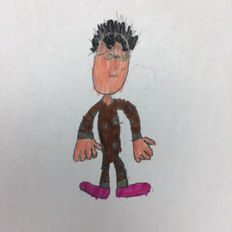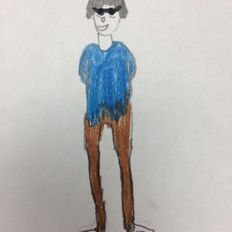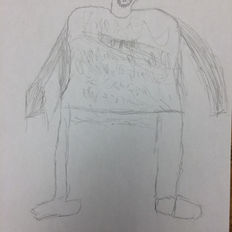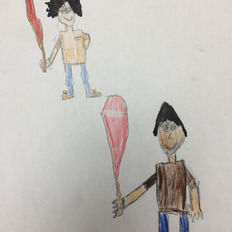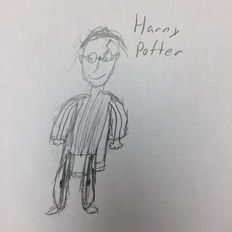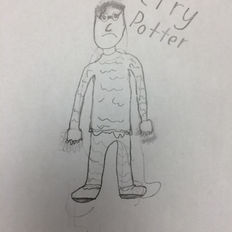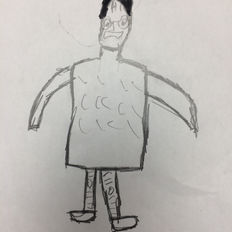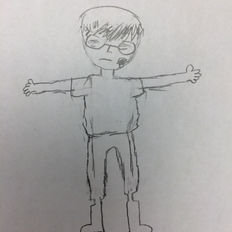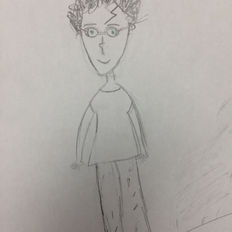
Mrs. Webster
September 5th, 2019

September 5th, 2019
Reading Strategy: Visualizing
Using details from the text to create [mental] pictures of characters, settings, scenes etc.




September 6th, 2019
Students use the reading strategy Visualizing to imagine and depict Harry Potter
Character details from the text:
-
Small and skinny
-
Has to wear old clothes of Dudley's, who is about four times bigger than him
-
Thin face
-
Knobbly knees
-
Black hair
-
Bright green eyes
-
Round glasses held together with tape
-
Lightning-shaped scar on forehead

September 9th, 2019
Writing Unit 1: Personal Narratives
Lesson 1: Examining the "Narrative Writing Recipe" through mentor texts
Just like we need specific ingredients and amounts to make the batter for that "perfect" chocolate chip cookie, we need specific "ingredients" in order to write well. Using a "mentor text" written by a grade 6 student, we analyzed what made it "work" by highlighting areas of interest and writing notes in the margins. We will continue to use mentor texts to support our writing. Mentor Text LINK
September 10th, 2019
Writing Unit 1: Personal Narratives
Lesson 2: Mining for Ideas through Small Moments
Think of some "small moments" (episodes) in your life. Examples could be "the time I found a baby bird," "the time I did a 360 on my scooter," "the time I fell into the water at the beach." Make a list of 6-8 "small moments." This is the beginning of our idea brainstorm for our personal narrative(s).
September 11th, 2019
Lesson 2 continued: Brainstorming small moments through people. For example, "the time my brother put a cup of salt instead of sugar into the cookie dough," "the time my friend ripped her sweater," etc.
Writing Unit 1: Personal Narratives
Lesson 3: Learning to focus on an episode through details
September 12th, 2019
How do we pull readers into our writing by showing instead of telling?
#1: Brainstorm:

#2: Showing "hungry" instead of telling:
Telling:
I’m hungry.
Showing:
My stomach grumbled as I climbed out of bed. I yawned and stretched, stumbling over to my dresser. A sizzling sound met my ears. Mmmm, I thought, is that bacon? As I staggered to the door, a whiff of slightly burnt toast tickled my nose. My mouth started to water. I rushed to the stairs, threw myself backwards and slid down the steps. Whooosh! I hit the floor with a bump.
September 16th, 2019
This Week's Spelling and Comprehension Words:
-
Deciduous
-
Coniferous
-
Addend
-
Difference
-
Integer
-
Product
-
Quotient
-
Acquire
-
Accept
-
Aghast
September 16th, 2019
Writing Unit 1: Personal Narratives
Continuing to Mine for Ideas through Small Moments
September 17th, 2019
Writing Unit 1: Personal Narratives
Practicing our descriptive writing through writing small "episodic" stories
Example (first draft): At my dad's birthday his friend Johnny sat on the back of our couch. "Crack" that was Johnny breaking the back of the couch.
Going back, revising and adding more descriptive detail: A sea of voices echoed through the house, making it hard to focus. "Gah!" I cried, as my game piece slipped out of my fingers for the third time. "They are so loud I can't concentrate on the game!" I screamed as I walked downstairs to tell them to be quiet. As I got to the bottom I heard a CRACK! It was louder than all the talking. Everyone looked at Johnny and laughed - even me. The couch he'd been sitting on was broken in two.
September 18th, 2019
This Week's Spelling and Comprehension Words (definitions and sentences):
-
Deciduous: Trees that shed their leaves in the Fall. Examples include poplar, maple, birch. Sentence: The maple tree is a deciduous tree because its leaves change colour and fall in Autumn.
-
Coniferous: Trees that often have needle "leaves" and cones (pine cones). Examples include fir, pine, spruce. Sentence: The fir tree is a coniferous tree because it has needle leaves that don't fall in Autumn.
-
Addend: A number that is added to another number in an addition question. Sentence: In the addition question 8 + 7 = ?, both the 8 and the 7 are addends.
-
Difference (math term): The answer in a subtraction question. Sentence: In the subtraction question 7 - 5, the difference is 2.
-
Integer: Integers are whole numbers, positive and negative. Zero is also an integer. Sentence: -6 and 6 are both integers.
-
Product (math term): The answer to a multiplication question. Sentence: the product of 9 x 9 is 81.
-
Quotient: The answer to a division question. Sentence: I divided 56 by 8 and the quotient was 7.
-
Acquire: To get/ obtain. Sentence: I acquired a cat on my way back from the grocery store; it just appeared and followed me home.
-
Accept: To agree. To take something that's offered. Sentence: I accept your invitation to your birthday party.
-
Aghast: Shocked, horrified. Sentence: I was aghast when I got mud all over my new white shoes.
September 19th, 2019
Reading Strategy: Re-reading
Referring back to the text in order to clarify, build on prior knowledge and solidify comprehension.
Reading Strategy: Predicting
Using text clues to make an informed and logical "guess" about what might happen next.
September 24th, 2019
Connecting Across Subjects: Language Arts, Sky Science, Democracy (Social Studies)
FLUFFY

from
"Harry Potter and the Philosopher's Stone
Based on
CERBERUS
Guard dog of the Underworld from Greek Mythology
Linked to
Constellations and Planets (Sky Science)
Ancient Athens (Social Studies)
Many cultural references (SS, LA)
Exploring the Myths:
Ancient Greek Gods and Goddesses LINK
Some Mythical Monsters from Greek Mythology LINK
Ancient Greece History LINK
September 30th, 2019
This Week's Spelling and Comprehension Words:
-
Citizenship
-
Issue
-
Fact
-
Opinion
-
Factor
-
Sum
-
Accidentally
-
Multiple
-
Depth
-
Curious
October 2nd, 2019
Writing Unit 1: Personal Narratives
Narrative inspiration doesn't have to be full of action or drama. They can be more psychological. Regardless of topic, be mindful of the "ingredients" needed for impactful writing. These include description (five senses, effective word choice) and figurative language such as metaphors, personification and similes.
Mrs. Webster's Exemplar LINK
Metaphors and Similes LINK
Personification LINK


October 2nd, 2019
Exploring: Quick-Writes
Quick-writes are timed writing pieces that evolve from a given prompt. The idea is to "let go" and just write. Quick-writes often result in some fabulously evocative writing!
We started Quick-writes this week with these three separate prompts:
You're standing on a beach by the water. There is a gentle breeze. What do you see/ smell/ feel/ touch/ taste?
My hand trembled as I reached for the doorknob. It slid in my hand. My palms were sweating. I desperately hoped that the door would be locked, but the handle turned - smoothly, easily. I took a shaky breath and eased the door open...
Imagine a place that you love. It can be anywhere. Start with "Sometimes..."
What do you see/ smell/ feel/ touch/ taste?
October 7th, 2019
This Week's Vocabulary Practice: Application
We're starting to extend and expand our knowledge of vocabulary through active weekly practice. Between the words you've already assimilated through listening and reading on an everyday basis, and the ones that we are actively learning through vocabulary lists, you are storing up quite a word bank! Our vocabulary goal this week is to effectively use some of our "new" words in our writing pieces, especially:
-
acquire
-
accept
-
aghast
-
issue
-
opinion
-
accidentally
-
depth
-
curious
Other vocabulary words in our word bank currently include:
-
deciduous
-
coniferous
-
product
-
addend
-
difference
-
integer
-
sum
-
quotient
-
citizenship
-
factor
-
multiple
-
fact
You are more than welcome to incorporate some of these also, and any other awesome word choices that come to mind!
October 15th, 2019
This Week's Spelling and Comprehension Words:
-
Justice
-
Equity
-
Freedom
-
Represent
-
Biotic
-
Abiotic
-
Bough
-
Cooperate
-
Conversation
-
Curious
October 22nd 2019
Writing Unit 1: Personal Narratives
Using a Graphic Organizer to Plan -
Beginning, Middle, End, Problem, Solution, Figurative Language and Descriptive Details

October 28th, 2019
This Week's Spelling and Comprehension Words:
-
Photosynthesis
-
Nutrients
-
Capable
-
Further
-
Disastrous
-
Whose
-
They're
-
There
-
Their
-
Variety
November 4th, 2019
A Long Walk to Water by Linda Sue Park. The true story of Salva Dut, one of the "Lost Boys" of Sudan.

Stay calm when things are hard or not going right for you. You will get through it when you persevere instead of quitting. Quitting leads to much less happiness in life than perseverance and hope.
- Salva Dut
Salva Dut TedXYouth Talk LINK
November 18th, 2019
This Week's Spelling and Comprehension Words:
-
Demonstrate
-
Gaze
-
Immediate
-
Knowledge
-
Obtain
-
Original
-
Prevent
-
Recently
-
Regardless
-
Relieve
